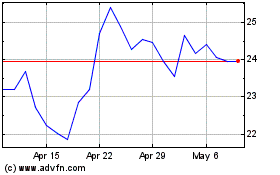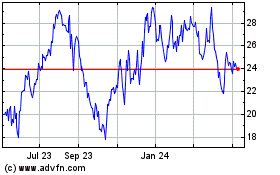Estée Lauder Battles Macy's Malaise -- WSJ
August 20 2016 - 3:02AM
Dow Jones News
By Sharon Terlep
The declining fortunes of U.S. department stores have Estée
Lauder Cos. on the defensive.
As one of the world's biggest beauty brands, the maker of
Clinique and MAC has reason to be worried: roughly 30% of its
global sales come from department stores. Macy's Inc., which
recently disclosed it will close 100 stores by early next year, is
Estée Lauder's biggest customer accounting for roughly 9% of its
annual revenue.
Chief Executive Fabrizio Freda said the company felt the impact
of store closures that Macy's has already carried out this year,
but he remains optimistic that his brands will flourish even if the
department store footprint shrinks. He plans to help department
stores lure in more shoppers by offering new products and services
from makeup lessons to makeovers.
"We are working hard to support our partners to go back to
increase this traffic at every level," Mr. Freda said. "If the
projects we are working on work, department store sales will
continue to grow in the U.S."
The New York-based company on Friday provided a
lower-than-expected profit forecast for 2017, anticipating slower
sales in the coming months. In the quarter ended June 30, the
company said sales were hit by declining retail traffic, especially
in midtier U.S. department stores. Sales in the Americas rose just
1% to $1.1 billion.
Shares of the company fell 3.5% to $91.73 on Friday.
Analysts fret that Estée Lauder could respond to the department
store malaise by chasing sales at less prestigious outlets such as
Ulta Salons that would cheapen its brands and irk higher-end
retailers.
"Is there a concern that at some point, you're going to get rid
of the scarcity," Bernstein Research analyst Ali Dibadj asked on a
call to discuss the company's results.
Mr. Freda said branching out to other retailers and online sales
is the only way to reach important and growing demographics such as
millennials.
"The brands that do not evolve their shopping habits to reach
this consumer will basically lose," he said.
Even with the growing popularity of beauty retailers such as
LVMH's Sephora and its more value-oriented rival, Ulta, Cosmetics
& Fragrance Inc., U.S. department stores remain an important
sales driver for the beauty industry.
About one-third of all fragrances and color cosmetics are sold
by department stores in the U.S., according to Euromonitor. Online
sales are growing but still a small part of the business: 10% for
cosmetics and 9% for fragrances.
Department-store sales are growing in other regions, including
the U.K., Western Europe and Australia, Mr. Freda said, which helps
offset weakness in U.S. chains such as Macy's and Nordstrom
Inc.
Coty Inc., whose brands include Calvin Klein and Marc Jacobs
fragrances and a number of other department store names, didn't
discuss the effect of store closings when it released its financial
results earlier this week. Coty's sales fell 6% in its Americas
region in the June quarter, excluding acquisitions, divestitures
and currency swings.
"Clearly we would like to see more top-line growth," Coty
interim CEO Bart Becht said.
Overall, revenue at Estée Lauder rose 5% last quarter over the
same quarter a year earlier to $2.65 billion. Its earnings dropped
39% to $93.5 million because the results didn't includes gains from
divestitures. The company forecasts sales for the coming fiscal
year will rise between 6% and 7%.
Write to Sharon Terlep at sharon.terlep@wsj.com
(END) Dow Jones Newswires
August 20, 2016 02:47 ET (06:47 GMT)
Copyright (c) 2016 Dow Jones & Company, Inc.
Kohls (NYSE:KSS)
Historical Stock Chart
From Mar 2024 to Apr 2024

Kohls (NYSE:KSS)
Historical Stock Chart
From Apr 2023 to Apr 2024
